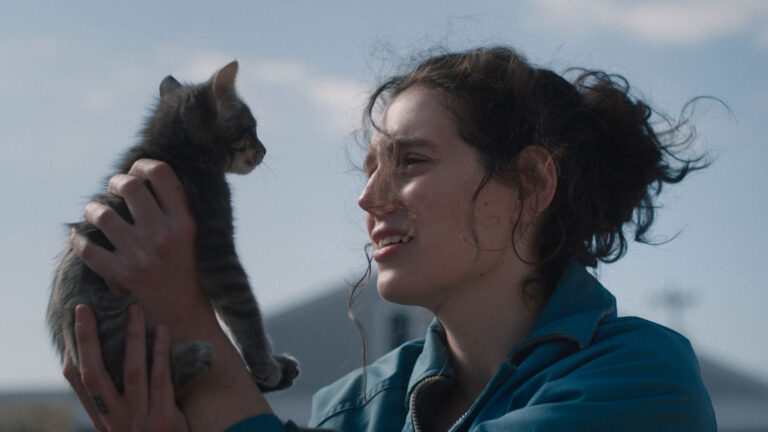Sparse in Its Emotional Beats and Tone Due To Its Disbalanced Script
So, just by this element alone, “Sorry, Baby,” again, seems like a shoo-in with the rest of the company’s filmography. However, this comedy-drama hybrid has something that distinguishes itself upon entry into their catalog and makes it feel more of the same. While poignant in moments where Victor expresses a saddened story about the intertwining of guilt, anger, and hope through the aftermath of a tragedy, the great majority of “Sorry, Baby” feels sparse in its emotional beats and tone due to how the film is scripted. Victor adopts a mumblecore energy that strips her feature debut from a human element. Deadpan, stiff readings with this type of story is an odd combination that, to my recollection, has not been done (or it is not near the usual approach a director does). But, in doing so, it removes the viewer from what Victor wants to dissect thematically.
“Sorry, Baby” tells the story of a small-town English teacher named Agnes (Eva Victor), separated into five chapters, placed in chronological order, except for its introductory one. Agnes is visited by her best friend, Lydie (Naomi Ackie). She hasn’t seen in a long while since Lydie moved to New York a few years back. Lydie has not been able to see Agnes as much as she wanted. Her new marriage and pregnancy have enabled Lydie to do so. This comes as a pleasant surprise to Agnes yet dour her a bit, primarily due to her slowly-growing anxiety. Lydie sees some signs that tell how Agnes is feeling on the inside. She grows concerned. But she does not want to “ruin” her visit by saying the classic question of “Are you ok?”
It echoes through one’s soul when in one’s worst emotional and psychological state. (The answer is always “No, I am not..”, but nobody, including me, will say it out loud when questioned. Instead, Lydie says: “Don’t die,” as a rather witty remark for Agnes to stay safe and sound. Agnes responds with her own funny remark. She states she won’t. And that, compared to previous years, she is feeling far better. This visit ends with Lydie asking Agnes to visit her in her free time in New York. Agnes is not in the current state of mind to commit to something like that. So, she replies with a “maybe.” Her face already says plenty. Something is drowning her on the inside, whether new or a past traumatic experience reappearing.
Distancing the Viewer After the First Two Chapters
Victor reveals the root of this anxiety in the subsequent chapters, beginning when Agnes and Lydie are in graduate school. An incident happened with Agnes and a fellow other grad student that left her scarred, and there were no repercussions on the aggressor. The film focuses on the moments before, during (without showing the act), and after such incidents, which are revealed to us via various scenarios–featuring many side characters–where Anges ponders her situation. The vagueness of the first chapter switches to a more revelatory tone in the upcoming four. While that element is lost in the rest of “Sorry, Baby,” one aspect present throughout the film is the use of deadpan, stiff (occasionally dry) comedy to deflect inner emotions or topics Agnes does not want to indulge in.
It tethers between mumblecore and quirky. That is a fine line where if it crosses too much onto one side, it is grating, and too much of the other, it is frustrating. Unfortunately, for director-writer (and lead) Eva Victor, as “Sorry, Baby” runs its course, it garners both feelings, distancing the viewer plenty not sole in comedy reliant (albeit this is far from being a pure “comedy” picture) scenes but also the film’s most essential dialogues as well, especially after the first two chapters. Mumblecore tends to divide audiences. You are either on the side of irritation or going along with it. There are many examples of this. One of my favorite films during my college years was Noah Baumbach’s “Frances Ha.”
Comparing the Mumblecore-like Influences in ‘Frances Ha’ and ‘Sorry, Baby’
I don’t tend to rewatch that picture as much as I used. It is a hard-hitting experience for me. I love “Frances Ha” because it shows the difficulties of growing up–time moving faster and breaking your sense of reality–when you do not know what to do with your life. Everyone has figured it out while you are staying still, stuck in a loop of confusion and decisions. Others may find the comedy element tacky or adhere to a false persona. But I believe that compared to Victor’s, Baumbach’s witty screenwriting does the film a service rather than damage it. “Frances Ha” relies on its mumblecore dialogue as a guise for the titular character, played by Greta Gerwig.
She does not know what to do with her life, so Frances retaliates with a quirk or two when questioned. Victor’s Agnes does the same thing when asked about her future or a topic she wants to avoid. The difference is that the people around Frances react to her comedy shield. In addition, Baumbach tends to switch more often between comedy and realism. This gives “Frances Ha” more stinging scenes that hit hard. (You, the viewer, have mostly experienced scenarios similar to Agnes at a time in your life.) Meanwhile, those around Agnes do not (and Victor’s inability to switch in tone when needed). This creates a faux element in each character dynamic. Although honest and from the heart–concealed yet arrow-pointed to strike viewers–these lines feel very unlike what an actual person would say, as if the characters never had human interactions before.
Sure, mumblecore movies tend to have this type of screenwriting, using low-volume chatter as ineloquence and comedy as shields. However, the constant sarcastic, overly thought-out dialogue makes it more grating than other mumblecore films. In its heartfelt moments, aside from a few key scenes (e.g., the jury scene), you feel a certain spuriousness during most character dynamics. The one dynamic where this writing delivery style works to its full effect is when Agnes and Lyvie are together.
Eva Victor and Naomi Ackie are the Uptapped Heart of the Film
That is primarily due to the great chemistry between Victor and Ackie. They bounce off each other with ease and delicately as well. It shows how their work together can overpower the screenplay itself based on energy alone. Their performances aren’t superb or anything of the sort. In my opinion, the two actresses are not so enthralling here. However, what makes them so fascinating to watch is how they convince the viewer that they are indeed long-time best friends who rely on each other for the good and bad times. Victor and Ackie, when paired together on-screen, show vulnerability and care. This causes their dynamic to separate itself from those shown during the film, which lack such emotion and vivacity.
Other small interactions show Victor’s potential as a screenwriter and director who can portray the beauty and melancholy of life via life’s minute connections. One of them, and my favorite in “Sorry, Baby,” is when Agnes shares a sandwich with a stranger, played by John Caroll Lynch (an under-appreciated actor in all regards). Although the film loses control of its tone and voice, this scene remains tightly knit together and untouched. This small moment contains the same power of those interactions that Lyvie and Agnes have together. Victor slowly paints the portrait she wants to present to us in the moments they spend together by the time the end credits roll.
Even if the central topics and themes in “Sorry, Baby” are dealt with in the format that audiences are accustomed to, this part of the intrigue in Victor’s vision. Seeing Victor try to navigate the wounding effects of a tragic incident as time passes–a challenging, complex topic all by itself–by employing a drama-comedy division is quite interesting on paper. However, I disliked how the dialogue was constructed, with each quip, note of sarcasm, or deadpan remark distancing me more from its vision and story. It is decisions like this that make or break a film. The tonal disbalance undercuts the severity and human elements.
“Sorry, Baby” screened at the 2025 Sundance Film Festival in the U.S. Dramatic Competition.



